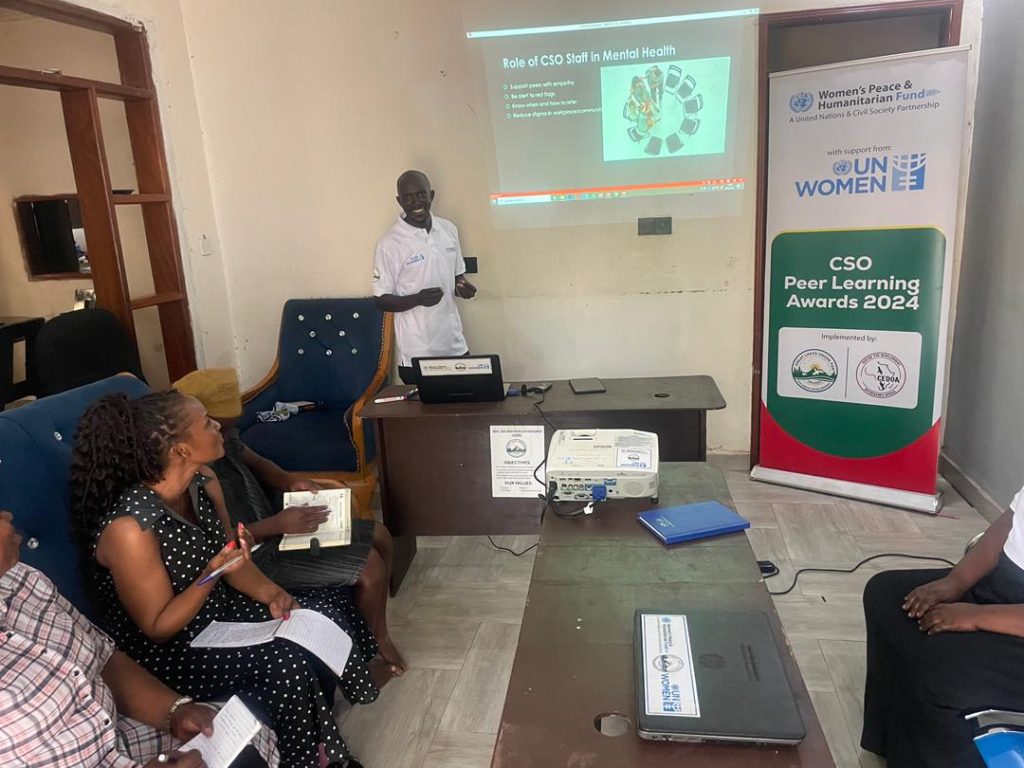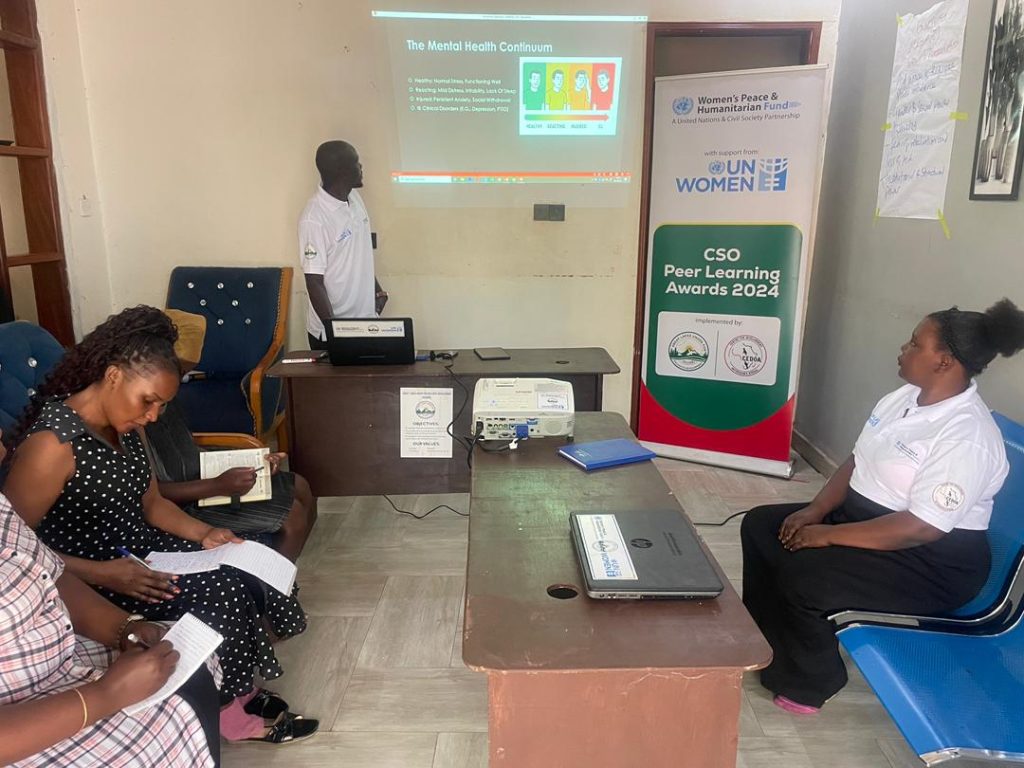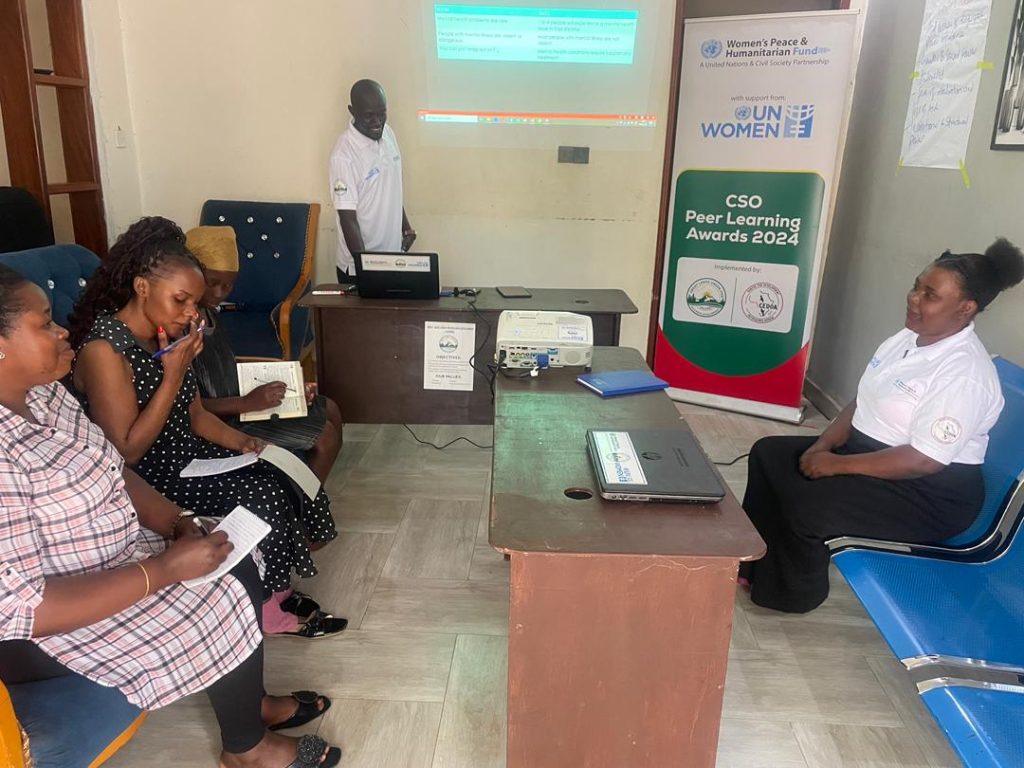
Prioritizing Staff Well-Being: GUIDE and CEDOA Hold Impactful Training on Mental and Emotional Health
Published by the Great Lakes Union for Inclusive Development (GUIDE) – July 2025
In a powerful affirmation of staff care as a core element of humanitarian and peacebuilding effectiveness, the Great Lakes Union for Inclusive Development (GUIDE) and the Centre for Development Outreaches Africa (CEDOA) conducted a joint three-day training on Mental and Emotional Well-Being from 23rd to 25th July 2025 at GUIDE’s headquarters in Jumba-Mpigi.
The training brought together 10 staff members from both organizations—spanning program officers, advocacy specialists, human resource, and administrative personnel—to deepen understanding and practical skills around mental health literacy, emotional intelligence, stress management, and organizational resilience.
This initiative was implemented under the CSO Peer Learning Award, funded by the UN Women’s Peace and Humanitarian Fund (WPHF) and supported by UN Women, with the aim of strengthening the institutional well-being of women-led and community-based organizations at the frontlines of humanitarian response.
A Safe Space to Build Resilience, Together
With mental health challenges increasingly recognized as a hidden crisis among humanitarian staff, the training opened up an honest and supportive space for participants to reflect, learn, and grow—both individually and collectively.
Facilitated by Karungi Dorcus, Caroline Opinde, Priscilla Namaganda, Faridah Karungi, and Abas Ruhweza, the sessions blended interactive lectures, role-playing, mindfulness exercises, group work, and action planning, ensuring an inclusive and emotionally engaging environment.
“This training helped me realize how much I neglect my mental well-being while focusing on others,” shared one participant during the closing session. “Now I have the tools—and the permission—to take care of myself, too.”
Highlights from the Three Days
Day 1: Understanding Mental Health and Emotional Intelligence
Participants explored foundational concepts of mental health, debunking myths and stigma, and learned how emotional intelligence affects communication, teamwork, and decision-making in high-pressure settings.
“I never realized how my own stress affects how I speak to others. I will now pause and check my tone and intent before reacting,” said Kirungi Diana, Executive Director of GUIDE.
Day 2: Building Coping Mechanisms and a Peer Support Culture


From strategies to manage burnout and respond to distress, to simulations on creating safe spaces at work, the day focused on developing peer-based approaches to psychological safety.
“Sometimes we only notice people are struggling when it’s too late. These tools will help us support each other early on,” remarked Shifa Nantongo, M&E Manager at GUIDE.
Day 3: Embedding Well-Being into Organizational Culture
The final day focused on transforming individual learning into collective action. Participants developed tailored Organizational Wellness Action Plans for GUIDE and CEDOA, outlining steps such as:
- Introducing mental health days and flexible work schedules.
- Designating Wellness Champions within departments.
- Strengthening internal policies on psychological safety and referrals.
- Promoting supervisor training on mental health-sensitive leadership.
“This will not just be another training. We are now moving to action,” affirmed Aisha Mbabazi, Program Officer at CEDOA.
Key Takeaways and Staff Reflections
The training delivered clear and impactful results:
- Improved Mental Health Literacy: Participants now confidently distinguish between mental health and mental illness and can recognize early signs of emotional distress.
- Enhanced Emotional Intelligence: Staff practiced empathy, active listening, and managing emotional triggers in workplace scenarios.
- Strengthened Peer Support Culture: Every participant committed to establishing or revitalizing peer support systems in their teams.
- Concrete Action Plans: Two distinct wellness strategies were drafted for GUIDE and CEDOA, complete with focal persons, timelines, and follow-up measures.
Materials Provided to Participants
Each participant received a comprehensive wellness toolkit, including:
- A Mental and Emotional Well-Being Handbook
- Self-care worksheets and coping tools
- A Mental Health First Aid Checklist
- An Organizational Wellness Assessment Template
- A Peer Support Guide
Looking Forward: Sustaining a Culture of Care
GUIDE and CEDOA are committed to mainstreaming staff well-being as a pillar of effective, ethical humanitarian work. The action plans developed during the training will be monitored and revisited through regular peer check-ins and strategic leadership reviews.
“Caring for our staff is not an add-on—it’s essential to our mission. When our teams are emotionally resilient, our work in the community becomes more grounded, responsive, and humane,” said Abas Ruhweza, GUIDE’s Program Manager.
To stay updated on GUIDE’s staff wellness initiatives and the peer learning award, visit www.guideug.org or email us at info@guideug.org.
